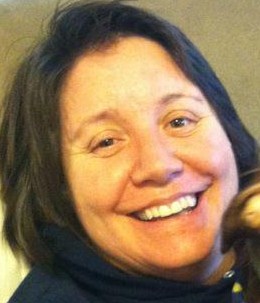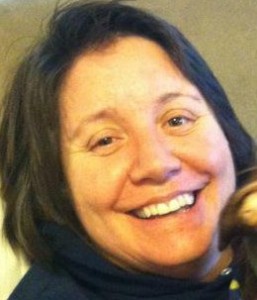McJustice – Donna Simon
The last week of July was a wild one at my church.
At our church, which used to be pretty quiet during the week, about three hundred people streamed in and out at all hours of the day and night, from late July through early August. And then again, some three weeks later.
As recently as three years ago, our church lay fallow for most of the hours between Sunday coffee hour and the following Sunday’s worship on any given week. Then there was a merger, and a new mission of “building hope and proclaiming peace on the Troost Corridor.” Our first real test of the integrity of that mission came a few months later, when we were asked to provide a home for Occupy Kansas City over the winter. We said yes and coughed up a large office on our third floor. Thus began our relationship with what is now the Midwest Center for Equality and Democracy. MCED formed the Worker’s Organizing Campaign of Kansas City, and that’s how we found ourselves at the center of a labor rights movement unlike any seen in decades—the campaign to alleviate some of the pain of low wage workers.
The recession has been good for fast food restaurants. Theirs is the segment of the industry which has grown since 2007. According to Bloomberg, McDonald’s saw its profits rise 135% between 2007 and 2011. Its CEO made $8.75 million last year. None of that largesse has trickled down to workers, alas. The median salary for a fast food worker was $18,564 in 2012.[1] Nearly all of them start at minimum wage, and raises are slow and difficult to come by.
There are lots of moving parts to this campaign, but its primary thrust has been provided by a pair of nationwide strikes meant to highlight the plight of workers making poverty wages. In Kansas City, the strikes meant a whole lot of people in our church building. And out. And back in. We began at six a.m. on the strike days, and went into the evening, layering actions at fast food restaurants with rallies and even a barbeque. Then the walk-backs begin. For days after, the workers were accompanied by teams of community leaders—elected officials, organizers, faith leaders—as they returned to work. It was the job of the walk-back team to let managers know that their workers had been part of a legal job action, and that any retaliation would be unlawful.
Then we watched and waited. When workers were threatened, phone calls ensued. It is still too soon to know how effective the movement has been so far. We know that some workers have actually seen an improvement in working conditions and hours. There is still a mountain of work ahead to ensure a just and living wage for the workers, most of whom are over twenty years old, and many of whom are supporting families. But we are proud of the movement so far.
And I am proud of St. Mark Hope and Peace Lutheran Church. It is not easy to host a labor movement. The day it rained, our floors looked pretty awful. There were many bags of trash and boxes of recycling. It was hot and humid, so our electric bill wasn’t pretty. And we didn’t pay attention to the folks going in and out of the fridge, so we didn’t notice until Sunday that some hungry body ate the communion bread. We used a hot dog bun a member brought from Chubby’s Diner after a frantic phone call from the communion assistant. I hope we never have to do that again, but I wonder if it wasn’t rather appropriate: a simple, even pedestrian representation of Christ’s body, on a week when we simply walked alongside the least of our siblings in Christ, after a wild week in which God gave us so much more than we gave away, and in which we were indeed building hope and proclaiming peace.
Donna Simon is a Midwesterner by birth (and temperament), though she has spent much of her life on the West Coast. She is a graduate of San Francisco State University (English Literature) and Pacific Lutheran Theological Seminary in Berkeley, California, and is pursuing a Doctor of Ministry in Congregational Mission and Leadership at Luther Seminary in St. Paul, Minnesota. Donna was called into the ministry from a volunteer position as church youth director at Messiah Lutheran Church, Redwood City, California. While attending seminary, she came out as a lesbian. Because the Evangelical Lutheran Church in America did not allow the ordination of openly gay and lesbian candidates, she joined the roster of Lutheran Lesbian and Gay Ministries, now known as Extraordinary Lutheran Ministries.
In 2000, Abiding Peace Lutheran Church extended a call. She was ordained on October 28, 2000. The ELCA changed its policy in 2009, and Pastor Donna joined the ELCA roster on October 28, 2010.
Donna enjoys hiking, reading, camping, fishing, retreats, cooking, movies, writing, and activism. She serves on the board of Hollis Renewal Center, a Lutheran retreat in Bonner Springs, Kansas, and Communities Creating Opportunity, a federation of faith communities engaged in faith-based community organizing. She teaches student pastors at St. Paul School of Theology in Kansas City, Missouri. She volunteers with several organizations in and around Kansas City, including Shalom House men’s shelter, and the KC Coalition for Welcoming Ministries.
[1][1] Bloomberg.com, December 11, 2012.


